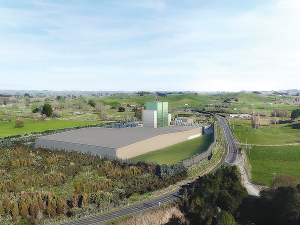Failed milk plant not so happy in the valley
The company behind a failed milk plant project in Otorohanga faces de-registration in New Zealand next week.
 Happy Valley Nutrition's proposed plant in Otorohanga will focus on specialised protein for its stage one development.
Happy Valley Nutrition's proposed plant in Otorohanga will focus on specialised protein for its stage one development.
The company behind a fledgling milk plant at Otorohanga in Waikato is focusing on specialised protein for its stage one development.
Happy Valley Nutrition executive chairman Kevin Bush told the company's annual general meeting last week that they have identified an opportunity in the marketplace for a dedicated milk processing facility manufacturing MPC85 - a milk protein concentrate from high quality NZ sourced milk.
Bush says MPC85 is a high value ingredient used in elderly and medical nutrition and is aligned with its strategy and consumer trends.
"Happy Valley has always stated that our ambition was to be a manufacturer of high-end nutritional dairy products for the global market, and MPC85 helps deliver against that ambition," he says.
"This brings simplicity and focus to the execution of Stage 1 of our master plan."
Happy Valley has been struggling to raise capital for the project.
Bush points out that MPC85 brings several benefits, including 45% reduction in capital expenditure to $180m.
It also means a shorter construction period and would allow the new plant to process its first milk in 2024. Bush says focusing on MPC85 would also lead to significant operational savings leading to higher gross earnings.
"Our due diligence and selection of MPC85 have been supported by a strong positive response from European dairy players.
"European dairy is facing several challenges, including rising feed and gas costs due to the Ukraine war, and regulatory intervention to limit potential dairy herd sizes.
"The cost to produce and future reduced milk supply is offset by consumer demand for protein-based dairy milk consumer products.
"Happy Valley is in negotiations to secure 100% of our MPC85 volume production with a few European dairy players," says Bush.
A 6ha site has been prepared at Otorohanga for the new milk plant. The project has been in the pipeline for several years as Happy Valley sought resource consents and funding. Covid-19 has also delayed the project by a few years.
The company says it is continuing positive discussions with strategic partners to secure funding.
Bush says 2022 continued to be a very challenging year, with Covid-19 lockdown still in place in Australia and New Zealand until May 2022.
"We continue to see long supply chain lead times and rising utility and feed costs, especially in Europe.
"The global ageing demographic trend is going to shape the food supply and requirements in the medium to long term future.
"This will change the prioritisation of food sourcing, manufacturing and consumer demand.
"Protein is a key requirement for elderly and medical nutrition, and dairy milk remains one of the best and most accessible sources of protein."
Voting has started for the renewal of DairyNZ's milksolids levy.
The most successful catchment groups in NZ are those that have 'a source to sea' approach.
Associate Agriculture Minister and Manawatu dairy farmer Andrew Hoggard says the free trade agreement (FTA) negotiated with India is not a bad deal and his party, Act, will support it when it goes before Parliament.
Newly released data from Environment Canterbury (ECan) Farm Environment Plan (FEP) audits are showing a dramatic lift in environmental performance across the region.
A solid recovery of global dairy prices this year makes a $9.50/kgMS milk price almost a shoo-in for this season.
As New Zealand marks the United Nations’ International Year of the Woman Farmer 2026 (IYWF 2026), industry leaders are challenging the misconception that women only support farming.
OPINION: Fonterra may be on the verge of selling its consumer business in New Zealand, but the co-operative is not…
OPINION: What does the birth rate in China have to do with stock trading? Just ask a2 Milk Company.